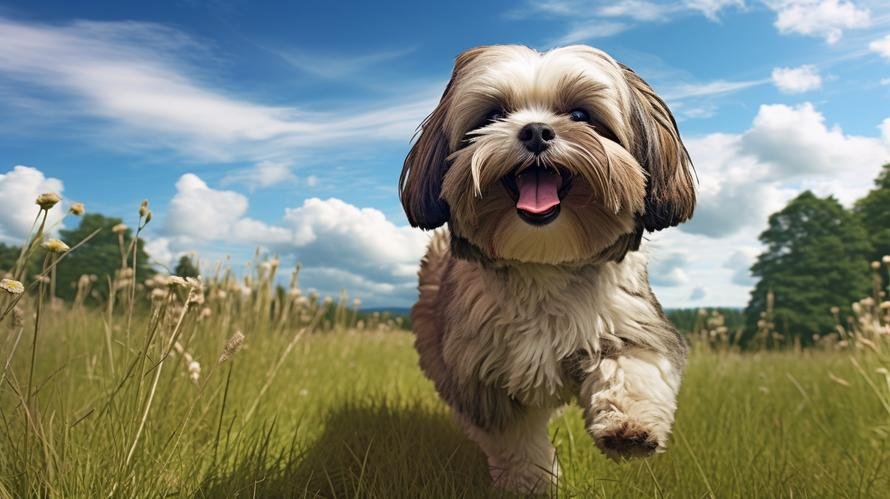Did you know that the Shih Tzu, a pint-sized dog known for its regal and stoic demeanor was named after the word “lion” in Mandarin Chinese? While their name may conjure images of powerful and ferocious beings, in reality, Shih Tzus are companionable, whimsical, and notably fuss-free! Now that you’ve already got a Shih Tzu or planning to have one, you’re likely to ponder upon one important aspect – their diet. And, of course, one of the central debates in the Shih Tzu diet universe is: should they eat grain-free?
Before we dive into the discussion, here’s a fun fact: despite their small size, your royal Shih Tzu boasts a mighty personality with a majestic mane significant to the lion. Paired with their expressive and lively eyes, this breed makes the ultimate pet for those needing an energetic and robust company. They sure can add a colorful sparkle to your life!
Now, back to the integral matter – their diet. It’s been a subject of serious debates among pet owners and vets alike. Some say grain-free diets are necessary for dogs, akin to their ancestors’ dietary habits in the wild. Others argue this diet is merely another marketing gimmick. So, who’s right? Let’s take a closer exploration together.
Grain-free diets gained popularity from the belief that they are more akin to the original, wild diets of dogs. Dogs descend from wolves, and it’s known that wolves don’t munch on wheat or corn in their natural habitat, right? Hence, this seems like sound logic. But there’s a plot twist: domestic dogs aren’t exactly wolves. Over the years, domestic dogs have evolved, and their digestive systems have adapted to a more omnivorous diet. It means that they can eat both meat and plants, including grains!
We hear you asking, “What does that mean for my Shih Tzu?” Well, like humans, dogs may develop allergies or intolerance to certain foods. Grains like corn, wheat, and barley are common allergens for some dogs. But it doesn’t imply that all dogs are allergic to grains. When grain allergies occur, dogs may exhibit symptoms like itching, paw biting, poor coat quality, frequent ear infections, and gastrointestinal issues like diarrhea and vomiting.
That being said, if your Shih Tzu is showing any of these signs or symptoms, it may indicate a grain allergy. In this case, seeking veterinary consultation and potentially switching to a grain-free diet could have health benefits for your canine companion. But this is not a universal rule that applies to all Shih Tzus.
However, elsewise, if your Shih Tzu is non-allergic to grains and is actively thriving on its grain-inclusive diet, there’s no compelling reason to switch it to grain-free meals. In fact, some reputable organizations, like the Food and Drug Administration (FDA), have been closely studying the potential links between grain-free diets and a type of heart disease known as canine dilated cardiomyopathy (DCM) in dogs. While the investigations are ongoing, the results may inspire caution when considering a grain-free diet.
In a nutshell, there’s no ‘one size fits all’ approach when it comes to nourishing your Shih Tzu. They each possess distinctive health needs that demand tailored dietary plans.
When it comes to your Shih Tzus’ diet, the most crucial aspect is nutritional balance. Ensure your Shih Tzu gets a balanced diet complete with carbohydrates, proteins, fats, vitamins, and minerals. Whether that nutrition comes from grains or other sources varies from dog to dog.
Remember, it’s essential to consult with your trusted vet before making any significant changes to your Shih Tzu’s diet. Your vet will give you professional advice based on your dog’s unique needs and provide the best possible option for a healthy and happy life. With the right diet, your Shih Tzu can continue to be the energetic, joyful ball of fluff that brings you so much happiness!
The journey of understanding your Shih Tzu’s dietary needs is indeed a royal ride of its own. Now, as you look at your petite ‘lion’, you’ll know the path to nourishing them appropriately isn’t about following trends, but about understanding your precious Shih Tzu’s individual health needs. Good health to them translates to joy and peace for you, and isn’t that what every pet parent ultimately desires?
So the next time your Shih Tzu looks up at you with those large, expressive eyes while you’re filling up their food bowl, remember to give more weight to their specific health needs rather than the latest diet fad doing rounds. Stay attentive to their behaviors and reactions after mealtime and consult with a vet regularly, the crown of good health your Shih Tzu deserves resides in the hands of informed decisions!



